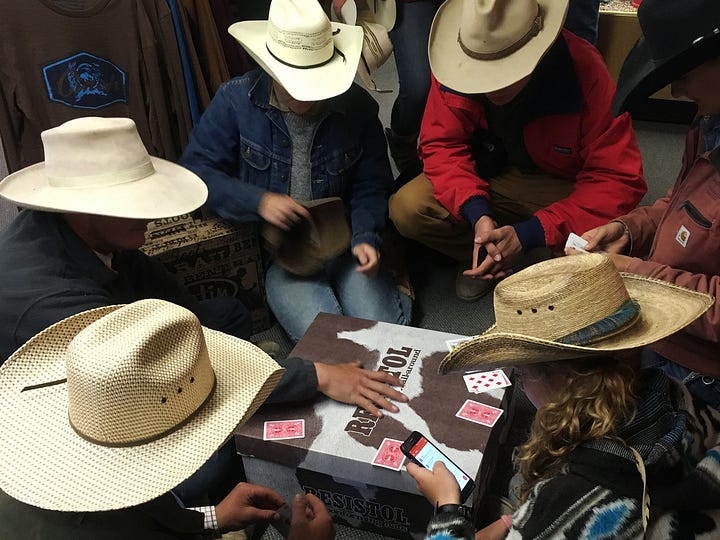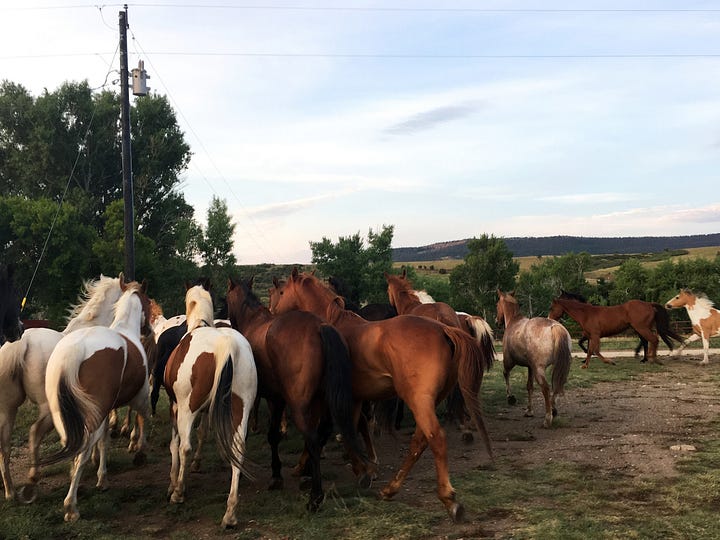On May 20th 2016 I graduated from art school. I had been living in Austin, TX for eight years - home of the hippies and hipsters - and had spent the last year living in a dilapidated, vegan-friendly, clothing-optional co-op house with thirty other people and half as many animals. I'd figured out I was wasn't straight a couple years ago, then figured out I wasn't into boys at all a few months prior during an illuminating New Years' Eve at a local queer bar. I'd recently gotten my first Dyke Chop, had a full portfolio of photography, sculpture, and performance art, and was excited to be graduated and heading onto bigger and better things.
Twenty-four hours later, I arrived at a 300,000-acre cattle ranch in rural New Mexico.
To be fair, I'd planned this - it wasn't like I'd gotten on the wrong flight leaving Austin. I'd applied for a wrangler position months earlier and was prepped with new cowboy boots, a hat, button-downs, some Wrangler jeans, and a lovely tooled brown leather belt. My job for the summer was looking after the herds of horses, burros, cattle, and bison along with two dozen other wranglers, and packing visiting guests around the mountains on horseback. I knew a bit about horse riding but Western riding was completely new to me, and I soon awoke to my new position as bottom-of-the-food-chain greenhorn. Most of the other wranglers had grown up in ranching culture and were already fairly seasoned at cowboy work, or at least had worked at the ranch in previous summers.


My knowledge and experiences from growing up in cities were deemed utterly worthless. The biggest insult you could be dealt was having "no common sense". It didn't matter that to me common sense meant how to navigate a crowded train station, or not to hang your bag on the back of your chair in a busy restaurant. Here, common sense was how tight to tie a horse's halter and whether to leave a gate open or closed. To lack this sort of common sense was, in the estimations of my fellow wranglers, equivalent to lacking a brain entirely.
These workplace growing pains would have been manageable if it weren't for my additional burden of being female. I had been lucky enough thus far to not have faced blatant sexism at my previous jobs, but now, in a traditional ranch setting, femaleness was all but disqualifying. There were other girls among the wranglers, but the bosses were old-school cowboys and the prevailing culture was one that glorified masculine cowboying above all else. Respect and acceptance came from embodying cowboy, which meant a rough-and-tough masculinity and a willingness to perform that masculinity. Over the summer, as I learned how to ride, shoe, herd, doctor, and pack horses, my standing among the other wranglers grew. This standing was accelerated as I simultaneously learned the specific mannerisms, attitudes, and physical embodiments of cowboying. To my surprise I found a huge amount of joy in my newly-leased cowboy masculinity, which mainly manifested as an easy, devil-may-care confidence. Despite a lifetime of sports I had never fully trusted my body's presence or physical capabilities; never overcome the residual delicacy of being raised female. By the end of the summer I leaned back in my chair and stretched my boots out before me; I paused before answering someone and was (mostly) given the airtime to do so; I hopped on the backs of kicking burros just to see if I could stay on. Cowboying allowed me to pull on an overcoat of maleness and I was delighted at how well it fit me.
The cowboy, both in popular imagination and ranching culture, is male. If one wants to be seen as a cowboy (and thus get hired for cowboy jobs), the male cowboy is always the metric one is measured against. This measuring is done by others within the cowboy and ranching community, which makes for a tightly-watched atmosphere of cowboys policing each other and themselves. One’s identity hinges upon two main axes: visual presentation - looking like a cowboy - and physical ability - being able to do the cowboy work. I soon realized that if I wanted to stick around in this world, being able to present "cowboy" correctly held more weight than my actual abilities. It rarely mattered if I was actually capable of doing the work - I was female, and therefore not cowboy. As queer theorist Jack Halberstam notes, "if masculinity is a protected and privileged form of expression, then there will be restrictions on who is allowed do it". Those restrictions came in the form of being denied, over and over again, chances to do the work that would have allowed me to prove myself as cowboy. There are ways to present cowboy “as a woman”, but it often ends up looking like cishet femininity on steroids and comes with restrictions on what one gets to do. Rodeos, for example, typically bar women from entering any event except barrel racing. And while there are women who work in ranching and cowboying who push past these limitations, their femaleness remains a part of their identity - in part as an assertion of their success in such a male-dominated industry. “Women in ranching” groups and “ranchHER” hashtags abound, but these groups rarely spoke to my own experiences. Even if I couldn’t articulate my non-binaryness at the time, cowboying as a woman was anathema to my entire existence: I had fallen in love with cowboying because of its masculinity. Accordingly, I modeled myself after other young men my age who were welcomed so readily into the work. And yet even when I followed masculine cowboy presentation to the letter, even when I could out-ride and out-perform those young men, I still ended up blockaded by the ever-present boundary lines of assigned gender.
Jack Lope Explains What A Cowboy’s Clothes Mean And How To Wear Them. 2019.
In the regular world, when one finds that their identity lies outside of cishet norms, they can turn to the queer world. Meeting other genderqueer people, trans people, drag artists, and so on creates community and offers inspiration and validation. In the cowboy world, however, no such option exists. You are either male or female; cowboy or not. To exist between these binaries is to live in an isolated no-man’s-land, risking social ostracization and loss of livelihood at best and violence or death at worst. After three years in ranching I had grown out my beautiful dyke fade into a choppy bob in an attempt to appear more feminine, straight, and hireable. At a grassfed beef conference I noticed that every single man present wore his cowboy hat, and every single woman - all of whom were just as involved in ranch work - did not. When I decided to wear my own cowboy hat I drew looks and comments; I removed it by the end of the day. Any isolated, marginalized person can attest to how exhausting being "the only one" quickly becomes, and the fear of homo- and transphobia in rural, conservative spaces was ever-present. The ghost of Matthew Shepard still haunts the highways and fence lines of the American West.
My Twitter handle at the time was “cowboy is gender-neutral” - a statement I hadn't fully convinced myself of, despite my best efforts. It nevertheless proved an extremely popular sentiment with online queers, who were rapidly becoming obsessed with cowboy imagery as Lil Nas X rose to prominence. I felt I had both failed at and been failed by cowboying, and my chagrin at other queers joyfully latching onto the Wild West could not have been any more bitter. I knew that the work itself could be done by anyone - nothing in the day-to-day of cowboying excludes itself to muscle-bound bodybuilders. But the unavoidable reality is that the blood, bone, and being of cowboy is comprised of a restrictive, punitive cishet masculinity that reviles and shuns anyone who deviates from its demands. I had followed these demands as closely as I could, and doing so had caused enough gender deviation that I was disqualified completely. As I left my last ranching job it was hard not to feel that I had sacrificed four years of my life on the altar of the cowboy, and had nothing but ashes left to show for it.
Thank you so much to everyone who has already subscribed to this little newsletter! Much appreciated. More to come.
x Lucy





I think there are damn few folks who know any part of the ranch world through a queer lens & who write about it.
Anyhow, saddle pal, looking forward to vignettes of the reality you know in that world.
Damn I miss that riding job in the 1980s. *Sigh*
Continually insightful. Thanks for sharing. The “What Cowboys Wear...” video made me want to see the Jack Lope version of the David Byrne film “True Stories”.